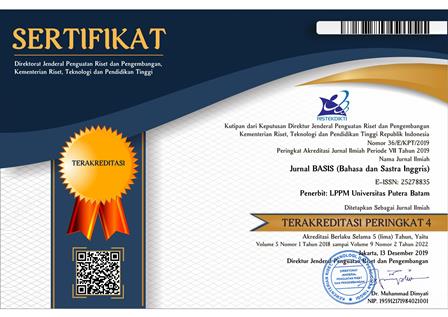LEXICAL COHESION ANALYSIS OF DONALD TRUMP’S SCRIPT SPEECH
-
DOI:
https://doi.org/10.33884/basisupb.v11i1.8182Keywords:
Speech Script, Cohesion, Lexical cohesion, Qualitative., Speech Script, Cohesion, Lexical cohesion, QualitativeAbstract
Abstract
This study has target to find lexical cohesion in the text of a speech delivered by a controversial president, Donald Trump. The researcher also reveals several reasons why the writing problem is on lexical cohesion where cohesive devices play an important role in shaping a speech and the use of language that is organized and easily understood by others in delivering a speech will have an impact on communication that goes well, so as to avoid misunderstandings between speakers and listeners. Therefore, the method used in this research is qualitative and this descriptive qualitative research also used observational method and note taking technique. In supporting data collection techniques, researchers use the theory of Creswell (2018) and also support by Merriam &Tisdell (2016) .The next by Litosseliti (2010). The lexical cohesion proposed by Matthienssen & Halliday, (2014) has several types of lexical cohesion consist of repetition, synonymy, antonymy, hyponymy, and meronymy. For the results of data analysis, there are 50 repetitions then 1 hyponymy then 1 meronym, 2 synonyms, and finally 1 antonym.
Keywords: Speech Script, Cohesion, Lexical cohesion, Qualitative
References
REFERENCES
Bahaziq, Afnan. 2016. “Cohesive devices in written discourse: a discourse analysis of a student’s essay writing.” english language teaching 9(7):112.
doi: 0.5539/elt.v9n7p112
EJ1101750.pdf (ed.gov)
Bill, Kill, Naomi Agustina Siadari, Jeremia Ertuah Sembiring, and Febrina Genesia Sianipar. 2023. “international journal of language learning and applied linguistics a discourse analysis on the lexical cohesion through song lyrics.” 2(2):1–7.
Creswell. 2018. research design: qualitative, quantitative and mixed methods approaches. Vol. 53.
Dyah kartikasari, Sumani. 2022. “lexical cohesion used in ‘ national column ’ of the jakarta Post.” 3(2):82–90.
Isma Farikha Latifatun Nuzulia, & Istiqomah Wulandari. (2020). An Analysis of Lexical Cohesion in Donald Trump’s Speech to the UN General Assembly 2017. IJOTL-TL: Indonesian Journal of Language Teaching and Linguistics, 5(3), 169-182. https://doi.org/10.30957/ijoltl.v5i3.635
Litosseliti. 2010. “Methods in Linguistics.”
Mandarani, Vidya. 2020. “Grammatical and lexical cohesion analysis of Trump’s Speech Upon Soleimani Assassination.” Jurnal Basis 7(1):131. https://doi.org/10.33884/basisupb.v7i1.1753
Matthienssen, Christian, and M. A. .. Halliday. 2014. Halliday ’ s Introduction to Functional Grammar. fourth edi. 2 Park Square, Milton Park, Abingdon, Oxon OX14 4RN: Routledge.
Morris, J., and G. Hirst. 1991. “Lexical Cohesion Computed by Thesaural Relations as an Indicator of the Structure of Text.” Computational Linguistics 17(1):21–48.
Paltridge, Brian. 2006. Discourse Analysis Paltridge 2006.
Sidabutar, Usman. 2021. “An Analysis of Lexical Cohesion on the Students’ Writing.” JETAL: Journal of English Teaching & Applied Linguistic 2(2):62–67. https://doi.org/10.36655/jetal.v2i2.533
Tisdell, Merriam &. 2016. “No.” Pp. 37–72 in Syria Studies. Vol. 7.
Widyaningrum, Lutfiah, and Silpia Rahayu. 2022. “Lexical Cohesion used in folklore.” 5(6):1132–36.

















